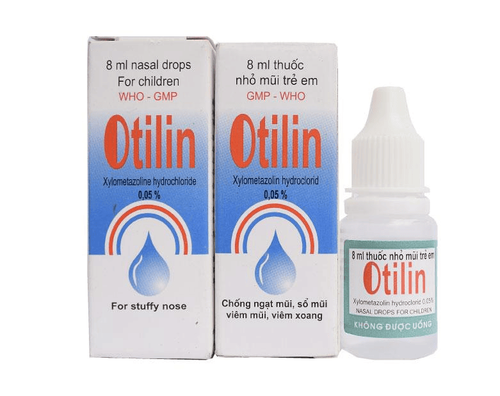This is an automatically translated article.
Syfazin medicine is made in the form of nasal drops with the main ingredient being Xylometazolin. Syfazin is used in the treatment of rhinitis and sinusitis.
1. What is Syfazin?
What is Syfazin? Syfazin medicine has the main ingredient is Xylometazolin HCl 5mg/10ml. Xylometazolin belongs to the group of arylalkyl imidazolines, acts on alpha-adrenergic receptors in the arterioles of the nasal mucosa, has vasoconstrictor effects leading to reduced blood flow, and at the same time reduces nasal congestion in the nasal mucosa and nasal passages. oropharynx regions.
The effect of the drug appears quickly within a few minutes after instillation and lasts many hours. Syfazin was well tolerated and did not impair the functions of the hairy epithelium even in patients with sensitive mucous membranes.
Indications: Using Syfazin in the treatment of: Rhinitis, stuffy nose, flu, sinusitis, allergic rhinitis.
Contraindications : Do not use Syfazin in the following cases:
People who are sensitive to one of the components of Syfazin; People with inflammation of the nose, ears and throat caused by fungi or viruses; Patients with hearing loss, neuritis; Newborns under 3 months old, people with angle-closure glaucoma; Patient is taking tricyclic antidepressants;
2. Usage and dosage of Syfazin
How to use : Use Syfazin by instilling directly into the nose.
Dosage:
For children from 3 - 24 months old: Use as prescribed by a professional doctor; Children from 2 to 6 years old: Apply 1-2 drops/time x 1-2 times/day; Note that the time to use Syfazin is not more than 1 week. Overdose:
Syfazin overdose has not been reported in adults; In some cases, Syfazin can cause poisoning in children by accident. Some of the following symptoms have been noted: High blood pressure, rapid and irregular pulse, some cognitive disturbances. If an overdose is encountered, the patient should be treated symptomatically under medical supervision. Missed dose: If you forget to take a dose of Syfazin, the patient should skip the missed dose and take the next dose as scheduled. There is no need to double the dose to make up the dose.
3. Syfazin side effects
Serious side effects are rare with the topical use of Xylometazoline at therapeutic doses. Some common but transient side effects such as: Dryness of the nasal mucosa, irritation of the mucosa at the contact site, back congestion may occur with long-term use. Some systemic reactions occur due to the use of nasal drops that penetrate into the throat causing tachycardia, increased blood pressure, and arrhythmia.
During the use of Syfazin, patients may experience some side effects such as:
Common: Local irritation; Rare: Headache, nausea, dizziness, palpitations, palpitations, bradycardia and arrhythmias. How to deal with side effects: Mild symptoms usually go away on their own but need to be monitored. Special attention should be paid to the occurrence of systemic absorption reactions, mainly for symptomatic and adjuvant treatment. Intravenous administration of phentolamine may be effective in the treatment of severe side effects of Syfazin.
4. Caution when using Syfazin
Some things patients should note before and while using Syfazin:
Caution when using Syfazin in people with hypertension, hyperthyroidism, heart disease; Syfazin should not be used in excess, because it can cause heat and more runny nose; Do not use Syfazin continuously for a long time, if used for a long time, it must be directed by a qualified doctor; Use caution when using Syfazin for people with prostate enlargement, arteriosclerosis, diabetes, who are using monoamine oxidase inhibitors; Use Xylometazolin preparations for children under 6 years of age only when indicated and under the supervision of a doctor for the short-term treatment of severe nasal congestion that has not responded to sodium chloride nasal drops or warm humidification; Syfazin should not be used repeatedly and continuously to avoid re-congestion. If self-medication, do not use more than 3 days. When using the drug continuously for 3 days without feeling better, should stop the drug and see a doctor; Using Syfazin for pregnant women: Syfazin should not be used in pregnant women and should be used with caution in women who are breastfeeding; Effects of Syfazin on the ability to drive and use machines: In the case of adult use of the drug for a long period of time or at higher than recommended doses, there is a possibility that the patient may experience symptoms of heart-related diseaes . In this case, the patient should be careful when driving, operating machinery, ...
5. Syfazin drug interactions
Syfazin drug interactions are: When using Syfazin, the systemic effects are insignificant. However, the effects of the drug may be increased when used concomitantly with tricyclic antidepressants.
During the use of Syfazin, the patient should strictly follow the instructions from the specialist doctor to achieve a good treatment effect. Patients must not arbitrarily change the way of use, dose, time of taking the drug, ... to avoid the risk of adverse effects on health in general.
Follow Vinmec International General Hospital website to get more health, nutrition and beauty information to protect the health of yourself and your loved ones in your family.
Please dial HOTLINE for more information or register for an appointment HERE. Download MyVinmec app to make appointments faster and to manage your bookings easily.













